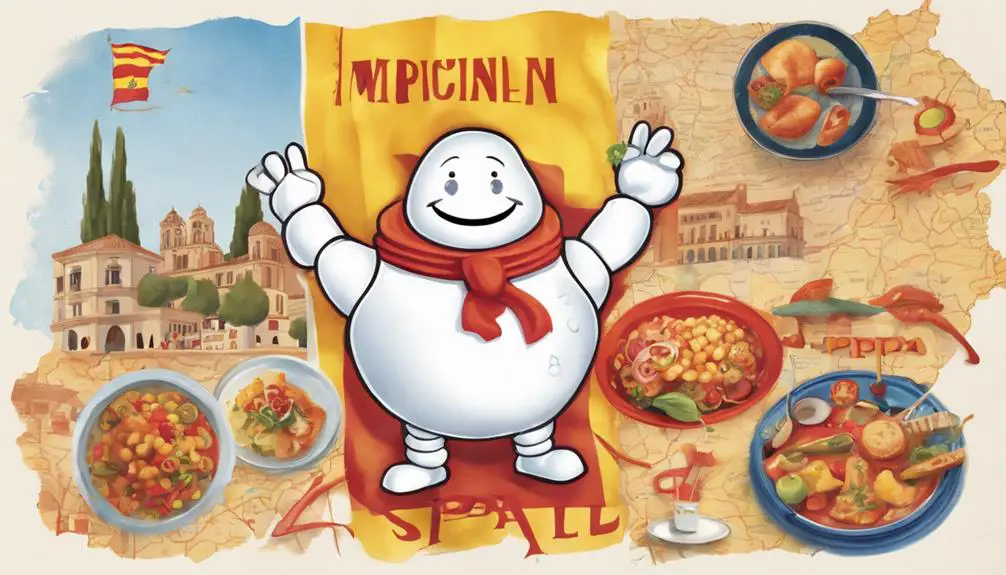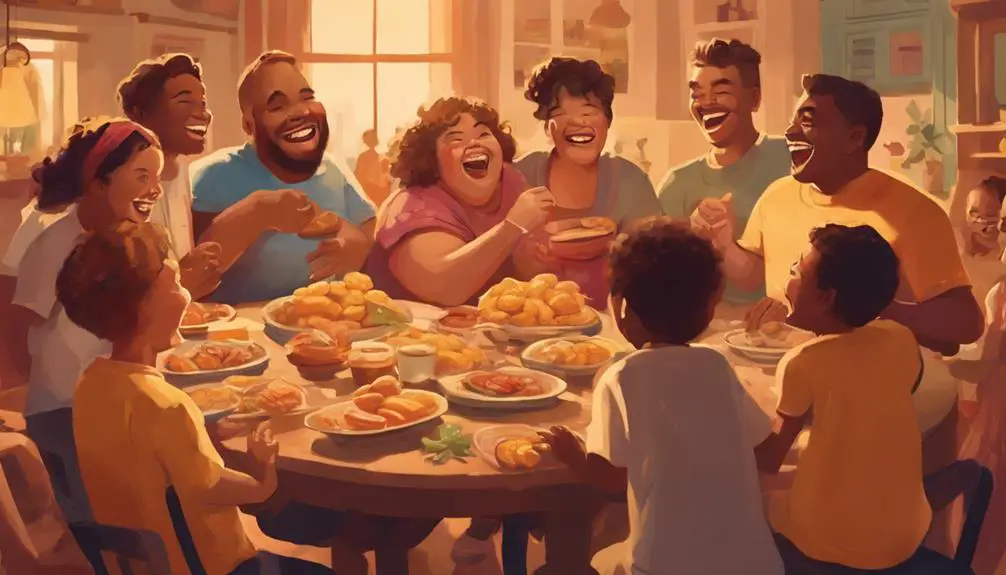When you explore Spanish slang, you'll find that "Michelines" or "rollos de grasa" (fat rolls) are more than just a lighthearted way to describe a bodily imperfection. These terms have evolved from cultural and historical influences, reflecting complex attitudes towards body image in Spanish culture. You'll discover that these terms have fostered collective empathy, strengthening social bonds and symbolizing national identity. As you dive deeper, you'll unravel the significance of self-deprecation, body positivity, and the shifting beauty standards in modern Spain. The story of fat rolls in Spanish slang has much more to offer, waiting to be uncovered.
Origins of the Term Michelines

The term 'michelines' originates from the Michelin tire company, whose advertisements in the early 20th century featured stacked tires resembling rolls of fat.
You might be wondering how this relates to the concept of fat rolls in Spanish slang. Well, it's quite fascinating. In the early 20th century, the Michelin tire company's advertisements featured stacked tires that looked eerily similar to rolls of fat.
This visual similarity sparked a fascinating connection between food analogies and body shape. The term 'michelines' emerged as a colloquialism to describe the rolls of fat around one's waist.
The historical roots of this term are deeply rooted in the clever marketing strategies of the Michelin tire company. By leveraging food analogies, the company inadvertently created a cultural phenomenon that would later become an integral part of Spanish slang.
As you delve deeper into the world of Spanish slang, it's essential to understand the origins of this term and its connection to food analogies and historical roots.
Evolution of Spanish Slang
As you explore the evolution of Spanish slang, you'll discover that colloquialisms like 'michelines' have been shaped by a complex interplay of cultural, historical, and social factors. The language has undergone significant transformations, influenced by various linguistic and cultural exchanges.
For instance, the Moorish occupation of the Iberian Peninsula led to Language Fusion, where Arabic and Latin merged, giving rise to unique linguistic forms. This blending of languages has contributed to the dynamic nature of Spanish slang.
In recent years, there's been a Slang Revival, marked by a resurgence of interest in colloquial expressions. This revival can be attributed to the increasing popularity of urban culture, social media, and the rise of youth-driven linguistic innovation. As a result, new slang terms have emerged, often blending traditional dialects with modern influences.
The evolution of Spanish slang is a continuous process, shaped by the country's rich cultural heritage and its ongoing linguistic adaptations. By examining this evolution, you'll gain a deeper understanding of the complex forces that have shaped the language and its colloquialisms, including 'michelines'.
Body Image in Spanish Culture

You'll find that the concept of fat rolls, or 'michelines', is inextricably linked to Spain's complex and often conflicting attitudes towards body image, which have been shaped by a mix of cultural, historical, and social factors.
Beauty standards in Spain are deeply rooted in the country's cultural identity, with a strong emphasis on physical appearance. Media representation plays a significant role in shaping these standards, often perpetuating unrealistic and unattainable beauty ideals. As a result, self-perception is heavily influenced by these representations, leading to a culture of self-criticism and low self-esteem.
Feminist perspectives argue that these beauty standards are inherently patriarchal, designed to control and objectify women's bodies. In Spain, this is particularly evident in the way women's bodies are often policed and judged, with fat rolls being a prime example.
The Rise of Self-Deprecation
Through humorously self-deprecating remarks, Spaniards often deflect attention from their physical appearance, masking deep-seated insecurities about their bodies. You may have noticed that your Spanish friends frequently make lighthearted comments about their weight or appearance, but beneath the humor lies a complex web of emotions. This phenomenon is closely tied to the concept of self-care and mental health.
| Self-Deprecating Remarks | Underlying Emotions |
|---|---|
| "I'm so fat, I need to go on a diet" | Insecurity about body shape, fear of judgment |
| "I'm a mess, I need to get my life together" | Anxiety about meeting expectations, fear of failure |
| "I'm so lazy, I just want to sleep all day" | Procrastination, lack of motivation, fear of not meeting goals |
| "I'm not pretty enough, I need to change my appearance" | Low self-esteem, dissatisfaction with physical appearance |
Fat Rolls as a Shared Experience

Within this framework, your Spanish friends' casual jokes about their weight often belie a deeper sense of camaraderie, since fat rolls, or 'michelines' in Spanish slang, have become a shared experience that transcends individual insecurities.
This collective acknowledgment of imperfections fosters an atmosphere of collective empathy, where individuals can relate to and commiserate with one another. By poking fun at their own bodies, your friends are, in fact, strengthening social bonds.
The lighthearted jokes and self-deprecating humor serve as a form of social glue, bringing people together in a shared experience of imperfection. This sense of shared vulnerability creates an environment conducive to social bonding, where individuals feel comfortable and accepted.
Fat rolls become a unifying force, rather than a source of individual insecurity. By embracing their imperfections, your friends are, in effect, celebrating the beauty of collective imperfection. This unique aspect of Spanish culture highlights the power of humor and self-deprecation in fostering strong social connections.
Social Media's Role in Popularization
Social media platforms have played a significant role in popularizing the term 'michelines', allowing the lighthearted humor and self-deprecation associated with it to spread rapidly across online communities.
You've likely seen influencer posts, memes, and hashtags that poke fun at the concept, making it a relatable and entertaining topic. This influencer impact has been pivotal in amplifying the term's popularity, as social media personalities with large followings share their own experiences and jokes about michelines.
The viral momentum gained from these posts has contributed to the term's widespread recognition, making it a staple of online discourse. You may have noticed how quickly a humorous post or meme about michelines can spread, garnering thousands of likes and shares in a short span.
This rapid dissemination of content has been essential in cementing the term's place in popular culture. By analyzing social media's role in popularizing michelines, it's clear that online platforms have been instrumental in shaping the term's cultural significance.
The Power of Humor in Language

Humor, when infused into language, can disarm and delight, making even the most mundane concepts, like fat rolls, more relatable and engaging.
As you explore the domain of Spanish slang, you'll find that humor plays a significant role in shaping the tone and atmosphere of language. By incorporating comedic relief, you can create a more approachable and lighthearted atmosphere, making language more accessible and enjoyable.
Wordplay wisdom is essential in crafting humor that resonates with your audience. By leveraging cultural satire, you can cleverly critique societal norms and conventions, adding depth and nuance to your language.
Additionally, humor analysis reveals that injecting humor into language can have therapeutic effects, making it an effective tool in language therapy. By harnessing the power of humor, you can break down barriers and create a more inclusive and engaging linguistic environment.
As you explore further into the world of Spanish slang, remember that humor is a powerful catalyst for connection and understanding.
Cultural Significance of Michelines
In Spanish slang, the cultural significance of Michelines, or fat rolls, extends beyond physical appearance, reflecting societal attitudes towards body image and beauty standards.
As you explore the cultural context, you'll discover that Michelines embody a complex web of meanings. They're not just a physical characteristic but a symbol of cultural nostalgia, evoking memories of traditional Spanish cuisine and family gatherings.
In the domain of food anthropology, Michelines represent a connection to national identity, where food and body image intersect. They're a social commentary on beauty standards, highlighting the tension between traditional values and modern ideals.
You'll notice that Michelines are often used as a metaphor for abundance, fertility, and generosity, reflecting Spanish values of hospitality and warmth. In this sense, Michelines transcend physical appearance, becoming a cultural icon that embodies the country's spirit and character.
Body Positivity in Modern Spain

As you explore modern Spain's body positivity movement, you'll find that the traditional reverence for Michelines is giving way to a more nuanced understanding of beauty and self-acceptance. The self-love movement is gaining momentum, encouraging individuals to embrace their unique features and reject unrealistic beauty standards. This shift is largely driven by changing media representation, which is gradually becoming more diverse and inclusive.
You'll notice that Spanish media outlets are now featuring a broader range of body types, ages, and abilities, promoting a more realistic and empowering portrayal of beauty. This increased representation is essential, as it helps to dismantle harmful beauty ideals and fosters a culture of acceptance. As a result, individuals are becoming more confident in their own skin, rejecting the pressure to conform to traditional beauty standards.
The body positivity movement in Spain isn't only promoting self-acceptance but also challenging the cultural norms that have long objectified and shamed individuals for their appearance. By embracing diversity and promoting inclusivity, Spain is taking a significant step towards a more positive and accepting body culture.
The Enduring Appeal of Rollos De Grasa
You'll often find that Spaniards affectionately refer to their love handles as 'rollos de grasa,' a term that has become an integral part of the country's cultural lexicon. This colloquialism has transcended generations, and its enduring appeal can be attributed to the cultural nostalgia it evokes.
The term 'rollos de grasa' is often used in informal settings, such as family gatherings or social events, where it serves as a conversation starter and a bonding agent. This phenomenon highlights the significance of social bonding in Spanish culture, where sharing laughter and playful jabs about one's physical appearance is a way to strengthen relationships.
Moreover, the widespread use of 'rollos de grasa' reflects a cultural attitude that values self-acceptance and body positivity. By embracing their imperfections, Spaniards demonstrate a carefree attitude towards physical appearance, which in turn fosters a sense of community and togetherness.
This cultural nostalgia for 'rollos de grasa' has become an integral part of Spain's cultural identity, symbolizing the country's relaxed attitude towards body image and its emphasis on social bonding.
Frequently Asked Questions
Can Men Use the Term "Michelines" to Describe Their Own Fat Rolls?
You might wonder if men can use the term 'michelines' to describe their own fat rolls. While it's not a traditional masculine trait to discuss body insecurities, masculine vanity is becoming more accepting.
Embracing body positivity, men can reclaim the term, focusing on self-acceptance rather than shame. By doing so, they can promote a healthier attitude towards body image, encouraging others to do the same.
It's time to break the stigma and normalize men discussing their bodies openly.
Is the Term "Michelines" Used in All Spanish-Speaking Countries?
When exploring regional variations in Spanish-speaking countries, you'll find that terminology differs greatly. What's widely accepted in one country mightn't be in another. You're likely to encounter country-specific terminology, making it crucial to understand local nuances.
In the case of 'michelines,' its usage varies across regions, and it's not universally adopted. You'll need to take into account regional differences to accurately communicate and avoid misunderstandings.
Can "Michelines" Be Used to Describe Other Body Types, Not Just Overweight?
You're wondering if 'michelines' can describe body types beyond just overweight individuals. The answer is yes.
While traditionally associated with excess fat, 'michelines' can also be used to describe athletic bodies with defined muscle tone, dubbed 'toned michelines.'
Even athletic individuals can have visible rolls due to muscle mass or genetics.
Considering this perspective, 'michelines' becomes a more nuanced term, acknowledging that body shape and size are complex and multifaceted.
Are There Any Derogatory Connotations to the Term "Michelines"?
Imagine walking into a crowded café, where a friend whispers a 'funny' comment about someone's weight. You cringe, feeling uneasy about body shaming.
Similarly, when exploring foreign slang, cultural sensitivity must be taken into account. Now, about the term 'michelines' – are there derogatory connotations? While it's primarily used to describe excess skin, some argue it perpetuates body shaming.
Be cautious: cultural nuances can be lost in translation, and what seems harmless might actually be hurtful.
Do Older Generations in Spain Use the Term "Michelines" as Frequently?
When you ask your Grandma about her vocabulary, you might notice that older generations in Spain don't use the term 'michelines' as frequently. This variation in language usage can be attributed to regional dialects.
In fact, older Spaniards might be more familiar with local expressions, which differ substantially from the standardized Spanish language.
As you explore the nuances of Spanish dialects, you'll find that regional variations greatly impact the language used by different generations.
Conclusion
As you explore the world of Spanish slang, you'll find that 'michelines' – or fat rolls – have become a cultural phenomenon. Like a thread weaving through the fabric of society, this term has evolved to represent a shared experience, a symbol of self-deprecation, and a bold rejection of traditional beauty standards.
As Spain navigates the complexities of body positivity, the enduring appeal of 'rollos de grasa' serves as a reminder that humor can be a powerful tool in shaping our perceptions of ourselves and others.






